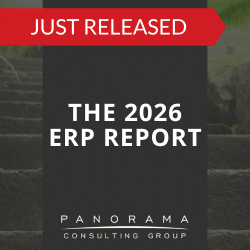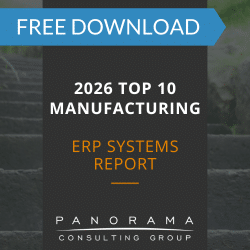Are you in the ERP selection phase of your enterprise software implementation? With so many interests from various stakeholders, you might be wondering what’s most important so you can ask ERP vendors the right questions.
Today, we’re sharing the top questions to ask ERP vendors when you want to cut to the chase and get the answers you need.
6 Questions to Ask ERP Vendors
ERP software, HCM software, and other types of enterprise systems are a high-stakes investment and a multi-year financial commitment, so you need clear answers you can trust. Here are some of the questions we recommend asking to get precise answers.
1. How Does the System Make Use of New and Emerging Technologies?
We don’t have to remind you how quickly technology outpaces itself. From a user-friendly interface to a multi-deployment model, there are several characteristics that distinguish modern platforms from the rest.
Ask each vendor how their software’s infrastructure makes use of new and emerging technology, such as machine learning and artificial intelligence.
In addition, you should ask how flexible their software is. Will you be able to configure and scale it to fit your specific business needs? How easy is it to integrate with third-party applications?
While the benefits of ERP depend on more than just the technology itself, you want to make sure that advanced capabilities are at least available should you need them.
The 2026 Top 10 ERP Systems Report
What vendors are you considering for your ERP implementation? This list is a helpful starting point.
2. What are all the Associated Costs?
Of course, even one of the top ERP systems isn’t viable if it’s beyond your price range. Thus, it’s important to understand the price tag associated with the capabilities you need.
While it can be uncomfortable to talk money, this isn’t a part of the conversation you can gloss over. It’s better to get these details out in the open now to avoid surprise costs down the road.
As you discuss numbers, keep in mind that there are three different types of costs:
- Initial costs associated with procuring and implementing the ERP solution
- Ongoing costs associated with maintaining the software over its lifetime (e.g., maintenance, support, subscription fees)
- Costs that you forgo by replacing old technology with modern ERP software (e.g., legacy technology maintenance, customization etc.)
While the initial and ongoing costs may be significant, don’t forget to subtract the IT costs that you will be avoiding by replacing your legacy software. You’ll need all of these figures to get a realistic view of how much you’ll spend over the system’s lifetime.
3. What Types of Services are Available?
Unless your team is highly trained in ERP implementation, there will be many parts of this process that pose a challenge. There are applications to configure, employees to train, data to migrate, and tests to run. Knowing this, many vendors will offer professional installation, implementation, and training services at an extra cost.
If you’re at the helm of a small-to-midsized (SMB) business with limited expertise, a vendor’s services might be of utmost importance. These offerings should be a major consideration as you compare vendors.
Along with the actual services offered, also consider other facets that will affect the level of service, including:
- Response time
- Level of expertise
- Overall attentiveness
While a vendor’s technical services are often robust, vendors usually only provide the bare minimum when it comes to the people and process aspects of implementation. Fortunately, you can fill these gaps by engaging an ERP consultant with change management and business process reengineering expertise.
4. How do You Plan to Improve Your Software Over Time?
The best software vendors are always looking ahead. They should be able to confidently speak to what their software will look like five, ten, or even 15 years from now.
As the ERP market is constantly evolving, you need a vendor who can keep up with these changes. Instead of just lip service about longevity, they should also be able to give you specific, short-term milestones that demonstrate their commitment to innovation.
Ask about their plans for research and development and their roadmap for platform-specific enhancements.
5. How do You Position Your Company in the Market?
When a company is well-established in its specific market, then it’s evident in its financial health. The organization is more stable and reliable, which allows them to invest more deeply in their products and clients.
Usually, ERP vendors that are highly-regarded in their niche got to this place because they can boast:
- A top-tier product
- A loyal, avid user base
- Favorable financial projections
You don’t want to go live with your new ERP platform only to find that the vendor hasn’t been able to gain its financial footing and has to discontinue the product you purchased.
Why might this happen? It’s common for larger firms to buy out struggling software developers, and their first order of business may be sunsetting your specific ERP system.
Asking about market standing now can give you the confidence to proceed.
6. What Version Will We be Receiving, and What Features Does it Currently Have?
To avoid being misled by ERP demos, we recommend providing vendors with demo scripts.
Vendors often show the latest and greatest, which means they may show you beta versions. The next thing you know, they’ve implemented a different version than the one they demoed.
While demo scripts are important, it’s also essential to carefully read the licensing agreement to determine which version you’ll be receiving.
Remember What Questions to Ask ERP Vendors
Software selection is a key phase of your ERP project, and you can’t afford to get it wrong. By asking the right questions of ERP vendors, you can ensure that the solution you select is a good fit for your organization and that your vendor is a good partner. This extends beyond the actual implementation and includes ongoing support and maintenance.
Our team of ERP experts can help you effectively communicate with vendors so you can keep them honest. Contact us below for a free consultation.













